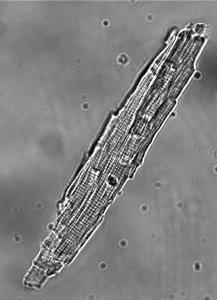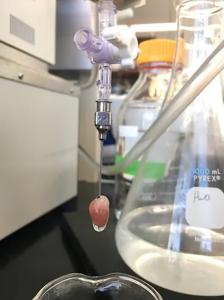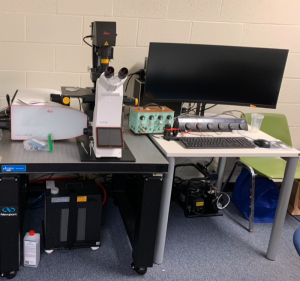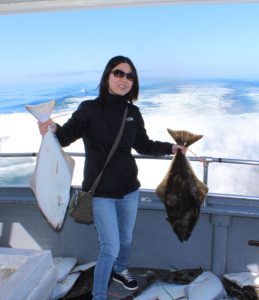 We are pleased to welcome Dr. Bin Liu to our Discover FSHN Series! Dr. Liu is an assistant professor of human nutrition in the Food Science and Human Nutrition Department at the University of Florida. Her lab‘s research focuses on investigating the effects of calcium on cardiac dysfunctions and developing novel therapies to treat diseases of the heart.
We are pleased to welcome Dr. Bin Liu to our Discover FSHN Series! Dr. Liu is an assistant professor of human nutrition in the Food Science and Human Nutrition Department at the University of Florida. Her lab‘s research focuses on investigating the effects of calcium on cardiac dysfunctions and developing novel therapies to treat diseases of the heart.
In this interview, learn about her research, her classes, and the most unusual food she’s ever eaten.
How did you become interested in studying the impact of genetics and diet on cardiac physiology and pathophysiology?
My fascination with cardiac physiology began during my graduate school years. The heart is a very interesting organ, and I am curious to know how it works.

Functioning as a muscular pump, the cardiac muscle’s contractions generate the force required to propel blood throughout the body. The role of calcium (Ca) ions in this process is of particular significance, as they serve as crucial signals dictating when individual cardiac muscle cells should contract. My research is centered on unraveling the intricate ways in which calcium controls the heart’s physiological functions and understanding how disruptions in calcium signaling contribute to various forms of heart disease (pathophysiology).
Throughout my doctoral and postdoctoral training, I delved into investigating the mechanisms underlying genetic heart diseases. This research encompassed familial cardiomyopathies and genetic arrhythmic heart diseases, both of which are severe and potentially lethal conditions, albeit affecting only a small fraction of the population. In contrast, a significant portion of the population experiences chronic heart diseases, often attributed to an unhealthy lifestyle characterized by an imbalanced diet and a lack of exercise. This realization prompted me to initiate studies in my independent lab, focusing on understanding how diet impacts cardiac function.
Cultivating a habit of maintaining a healthy diet early in life may prove instrumental in averting cardiovascular disease later.
Our investigations began with studying a fructose-rich diet, revealing its capacity to induce prediabetes in mouse models within three weeks. We explored the disease on the cellular and molecular levels to identify aberrations in calcium signaling. Armed with this knowledge, we aim to uncover strategies for preventing disease progression and developing innovative therapies.

Tell me about your path to UF.
UF is a top-ranked research institute that offers an excellent environment to foster interdisciplinary collaborations between researchers with diverse backgrounds and expertise. I am excited to be part of this dynamic research community. In particular, I look forward to working with the talented graduate and undergraduate students at UF.
Would you share some of the recent projects you are working on?
One of our projects focuses on how diet induces metabolic heart diseases, including prediabetes and diabetes. So far, we have generated the prediabetes model by using a high-fructose diet. Next, we will create a type 2 diabetes model by administering a high-fat and high-sugar Western diet to mice. We will study how calcium signaling is impacted in these models and what we can do to prevent disease progression. Preliminary evidence suggests that manipulating calcium-handling proteins in mitochondria plays an important role in impacting metabolic heart diseases, and we will delve deeper into the mechanism.
Another major project is focused on a genetic arrhythmic disease called catecholaminergic polymorphic ventricular tachycardia (CPVT). Interestingly, the CPVT mitochondria seem to play a unique protective role in preventing the heart from developing more severe symptoms. We are trying to understand these protective changes because we may apply what we learned from CPVT to treat metabolic heart diseases.

What classes do you teach?
I will teach three lectures for the course FOS5645 – Functional Food in the spring of 2024. In fall 2024, I will teach the course HUN2201 – Fundamentals of Human Nutrition.
What do you believe is the most important fact the public should know about diet and heart health?
One of the most crucial facts the public should be aware of regarding diet and heart health is the substantial impact that dietary choices can exert on the risk of heart disease and overall cardiovascular health. Equally important is the early adoption of heart-healthy dietary patterns. Research in mouse models has demonstrated that a three-week fructose diet induces prediabetes and cardiac dysfunction, while a four-month high-fat/high-sugar diet leads to diabetic cardiomyopathy.
The encouraging aspect is that both conditions are reversible with a switch to a healthy diet. Cultivating a habit of maintaining a healthy diet early in life may prove instrumental in averting cardiovascular disease later.

What do you like to do in your free time?
I like traveling, watching movies, cooking, and baking. I finally got an air fryer at my home. My daughter and I had so much fun trying new recipes with this new toy in our kitchen!

What is the most unusual food you have ever tried, and how did you come across it?
Maybe stinky tofu. It is a quite common street food in my hometown. I only realized it was unusual after I left my hometown. It is a fermented tofu dish with a strong odor that’s either loved or disliked by those who try it. It’s typically deep-fried or pan-fried.
Interested in learning more about FSHN’s Nutritional Sciences programs? Read more here and here and here!
P.S. The Discover FSHN Series highlights the unique experiences of UF’s Food Science and Human Nutrition students, faculty, staff, and alumni. Want to read more about the amazing work going on in the FSHN department? See our previous features below (click on arrows to expand):
Undergraduate Students:
Shannon Mai, Dietetics
Alex Colon, Dietetics and Jenny Duong, Food Science
Jackie Shannon, Nutritional Sciences
Jennifer Jordan, Food Science
Lily Tucciarone, Dietetics
Tim Cassella, Nutritional Sciences
Kate Mullis, Dietetics
Charles Overdevest, Nutritional Sciences
Graduate Students:
Savanna Curtis, Food Science (M.S.)
Carley Rusch and Matthew Beke, Nutritional Sciences (Ph.D.)
Alexa Hosey, Dietetics (MS/DI)
Vicnie Leandre, Food Science (M.S.)
Rufus Theophilus, Nutritional Sciences (Ph.D.)
Amber Fritsche, Dietetics (MS/DI)
Amy Jones, Food Science (Ph.D.)
Melissa Perez Santana, Food Science (M.S.)
Jeena Endter, Dietetics (MS/DI)
Postdoctoral Associates:
Dr. Cameron Bardsley, Food Safety
Dr. Tautvydas Shuipys, Food Safety
Dr. Felix Jimenez Rondan, Nutritional Sciences
Faculty:
Dr. Naim Montazeri, Food Science/Food Virology
Dr. Jeanette Andrade, Dietetics
Dr. Zhiyong Cheng, Nutritional Sciences
Dr. Juan Andrade Laborde, Global Nutrition
Dr. Razieh Farzad, Food Science
Dr. Beth Gankofskie, Dietetics
Dr. Anne Mathews, Nutritional Sciences
Dr. Diana Taft, Nutritional Sciences
Dr. Boce Zhang, Food Science/Food Microbiology
Dr. Cora Best, Nutritional Sciences
Dr. Katherine Thompson-Witrick, Food Science
Dr. Laura Acosta, Dietetics
Staff:
Sharyn Passeretti, Lab Specialist
Herschel Johnson, Manager of Student Services
Brandy Johnson, Administrative Assistant
Kohrine Counts Hazim, Dietetics Program Coordinator
Alumni:
Dr. Rebecca Gould, Dietetics, Postdoctoral Research
Dr. Becca Solch, Nutritional Sciences, Postdoctoral Research
Hannah Cooper, Dietetics, Private Practice
Dr. Richie Li, Food Science, Product Development
Doctor Brian Barrow, Nutritional Sciences, Medicine/Physician
Luciano Junoy, Food Science, Product Development
Carlin Dixon, Dietetics and Professional Dance
Jamie Zeldman, Dietetics, Research Coordinator
Ellen Bowser, Dietetics, Preceptor
Nina Burt, Food Science, Research & Development and Innovation
P.P.S. Learn more about FSHN’s renowned programs below!
Undergraduate Programs:
Dietetics
Food Science
Nutritional Sciences
Graduate Programs:
M.S. Dietetic Internship Program
M.S. Food Science and Human Nutrition
Ph.D. Food Science
Ph.D. Nutritional Sciences
 2
2
